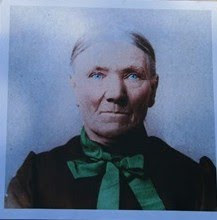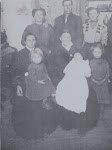Written by Julia Chappell great-granddaughter: Sources and Information of this life history come from extensive research.
John Boice was born 20 February 1814 in Fredricksburg, Ontario, Canada. He was the tenth child of Benjamin Boice and Margaret Bartley Shuman formerly of New York. On the 7th of June 1835, John married Martha Jane Herns. She too was born in Fredricksburg, on the 3rd of March 1816, the daughter of Thomas Herns and Martha Jane Cronk who were of Scottish origin.
Martha became a member of the Church of Jesus Christ of Latter-Day Saints on the 6th of February 1835, just before she was married, but John was not baptized until the 7th of October 1836.
On March 2, 1836 a little girl was born to them and they named her Martha Jane after her mother and grandmother. Their second child, Thomas, was born two years later on 15 February 1838. That same year the little family decided to move from Canada to Kirtland, Ohio, to join with the Saints there.
The following year, 1839, the family again pulled up stakes and began the move from Kirtland to Missouri. Somewhere in Illinois, presumably in Barry, the Boice family met some of the members of the Church who, having been driven out of Missouri, were on their way back to Kirtland. The stories they must have heard of the mobs, persecution and violence, coupled with the imminent birth of a new baby, forced the family to remain for a time in Barry, Pike County, Illinois where their third child, Benjamin, was born on the 7th of October 1839.
Near the end of the year, when baby Benjamin and his mother were well enough to travel, the family began the perilous journey back to Kirtland. By February 1840, they had arrived at Hudson, Ohio when Martha became desperately ill from quick consumption, no doubt as a result of the hardships of travel with a new baby and two little children, plus exposure to the bitter cold.
Weakened by her physical suffering, depressed because of the persecution they had had to endure, and realizing that she did not have long to live, Martha promised that after her death her three little children, the oldest not yet four, would be given to a certain woman she knew who was not a member of the church.
Martha had lain ill for days when on the evening of February 13, 1840, she apparently died. Her body was laid upon a bed at the end of the room. Tallow candles cast a restful glow upon the women who were busily engaged in fashioning her burial clothes. A sorrowful husband sat there too. His occupation through the night was to keep the fire alive that glowed upon the hearth and made the long shadows dance in the dim-lit room. The children slept. In the still hours of the morning a voice called out from where his dead wife lay. "John. John, please raise me up."
John hastened to Martha's bedside and gently raised her up. She cautioned him not to be afraid, and told him that she had been in the spirit world but had obtained permission to return for a few hours only. She said that she had come back to tell John that she now knew that she wanted her husband to rear their little ones and not the woman she had promised. "But just two of them" she said "for I am going to take one of them with me."
Martha also told John that she had made a grave error in allowing herself to grow weary of the Church. She declared a sure testimony of the truthfulness of the Gospel and praised God for what had been declared to her by angelic spirits of the Latter Day works. She testified that "Joseph Smith is the great prophet raised up to open up this last dispensation" and was full of joy for being able to return and bear this testimony and rectify the mistake of giving away her children, and "she continued bearing her testimony until her last breath."
Those present thought that she would get well, as she ate and slept, and "talked in a strong voice" for the hours allotted to her. That night at 8 o'clock, precisely twenty-four hours from the time of her death the night before, her spirit took flight once more and she passed from this world on the 14th of February 1840.
Upon returning from Martha's burial the next day, John found little Thomas "was dying but not with any sickness perceivable." And so it was that on the same day Martha was buried, and on the very day Thomas turned two years old, the 15 of February 1840, that he left this world to be with his mother and was buried beside her in Hudson, Ohio.
John took his little daughter, Martha Jane, and the four month-old baby, Benjamin, on to Kirtland. There he married his second wife, Mary Ann Barzee three month later, on May 7, 1840. They received their endowments and were sealed in the Nauvoo Temple on the 22nd of January 1846 just before the exodus from Nauvoo began. John and Mary Ann had nine children born to them, number eight being my grandfather, Elijah Boice.
John and Mary Ann moved west with the Saints, stopping for a time in Council Bluffs, Iowa and on from there to Salt Lake City. They were sent to help settle Spanish Fork, Utah, Camus, Utah and Oxford, Idaho. John and Mary Ann were called to work in the Logan Temple. Much of the temple work done for their family members and friends was done by them and their children. John died a Patriarch on March 31, 1886. Mary Ann joined him more than 16 years later on the 7th of October 1902. They are both buried in the Oxford Cemetery, Oxford, Idaho.
&&&&&&&&&
Publisher's Note: Tuberculosis was known as "consumption" in the 1800's.














